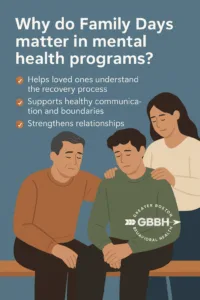Even when you’re trying to stay strong, loving someone in a mental health program can feel like standing on shifting ground. You want to help—but sometimes, you don’t know what’s helpful anymore.
You’ve held their hand through hard nights, researched symptoms you didn’t have names for, and tried to stay hopeful even when the cracks showed. Now they’re in treatment—and you’re left wondering what your role is. Family Days exist for moments like this.
At Greater Boston Behavioral Health’s mental health programs, Family Days are more than just visits. They’re a chance to reconnect, repair trust, and understand the recovery process—together.
What Is a Family Day in Mental Health Programs?
Family Days are scheduled events within treatment programs where loved ones—partners, parents, siblings—are invited to participate in part of the recovery process.
These days aren’t passive. They are clinician-led, intentionally designed opportunities for:
- Education about mental health diagnoses
- Skill-building in communication and boundaries
- Insight into the treatment process
- Time to connect in a safe, therapeutic space
They often include group sessions, psychoeducation workshops, and carefully facilitated one-on-one conversations.
In our Boston-area mental health programs, Family Days are built to bridge the clinical world and the home environment. Because no one heals in a vacuum—and no relationship recovers without support.
Why Do Family Days Matter So Much?
Because mental illness doesn’t just affect the person receiving care. It stretches into the household, the relationship, and the emotional patterns you’ve shared.
One partner shared, “It wasn’t until Family Day that I understood it wasn’t just stress or moodiness. I saw their pain in a way I couldn’t before—and it helped me be less reactive and more supportive.”
When loved ones participate in the recovery process, it:
- Helps reduce shame and secrecy
- Builds a shared vocabulary for what’s happening
- Validates the emotional labor both sides are carrying
- Creates a healthier relational dynamic
We’ve seen Family Days act as turning points. For the client, it’s a moment of feeling seen and supported. For the partner, it’s often the first time they receive structured guidance on how to stay connected without losing themselves.
What Happens If Families Don’t Participate?
When Family Days are skipped—or unavailable—disconnection tends to deepen.
The person in treatment may feel alone or abandoned. They may interpret a loved one’s absence as disinterest or resentment.
On the flip side, partners often feel like they’re walking blindfolded through recovery. They want to be supportive, but they’re operating with limited information.
Without guidance, it’s easy for unhealthy cycles to continue:
- Over-functioning (trying to fix everything)
- Withdrawing emotionally out of burnout
- Misunderstanding what “progress” looks like in recovery
We’ve seen couples begin to drift during treatment—not because they didn’t love each other, but because they were healing in separate rooms. Family Days create a shared space again.
What If You’re Scared to Show Up?
It’s okay to feel scared. Maybe you’re still angry. Or you’ve been holding so much together, it feels safer to keep your distance.
You might think:
“What if I say the wrong thing?”
“What if I break down?”
“What if I hear something I don’t want to know?”
These fears are valid. And they’re welcome in the room. Family Days are not about confrontation—they’re about creating a safe container for whatever is real.
You don’t have to be perfect. You don’t even have to talk much. Sometimes just being there says, “I’m still here. I care. And I want to understand.”
How Family Days Support Boundaries, Not Just Bonding
One of the most misunderstood parts of Family Days is the assumption that they’re just for hugging it out and “moving on.”
In truth, they’re often where real conversations begin—about boundaries, roles, and relational dynamics that need to shift.
You might hear a clinician say:
- “It’s okay to have limits.”
- “Support doesn’t mean rescuing.”
- “Healing requires space for both of you.”
For couples, this can be game-changing. It gives both people a language for what they’re going through—and permission to protect their own wellbeing while staying connected.
Local Support That Understands Boston Families
In a region like Greater Boston, where people juggle demanding work schedules, tight family networks, and small living spaces, Family Days need to be realistic.
At Greater Boston Behavioral Health, we design Family Days with local life in mind. We serve individuals and families across Needham and Newton, where the pressure to “keep it together” often hides real emotional strain.
We know you’re likely commuting, caring for kids, or holding down a job while trying to be there for someone in crisis. That’s why our Family Days are practical, emotionally intelligent, and rooted in the belief that healing doesn’t happen alone.
What If They’re Not Ready Yet?
Sometimes your loved one isn’t ready to invite you to Family Day. That’s okay too.
You can still reach out to the clinical team. You can still ask how to support them. And you can still learn the tools that help you take care of yourself—because your mental health matters too.
Healing often happens in layers. Even being willing to show up when the door opens is an act of love.
FAQ: Family Days in Mental Health Programs
What if we’ve had conflict recently—should I still attend?
Yes. Family Days are meant to support real relationships, not perfect ones. If there’s been tension, that’s even more reason to attend. Clinicians can help facilitate conversations in a safe way.
Can I attend Family Day even if we’re not married?
Absolutely. Partners, long-term significant others, and even close friends are often welcome. If you’re an emotional anchor in their life, your presence matters.
Do we talk about private issues in front of a group?
Family Days often include both group and one-on-one elements. No one is forced to share more than they’re comfortable with. The goal is connection, not exposure.
What if I’m too overwhelmed to go?
That’s okay. You can call the center and ask to speak to a clinician. Even a phone call can be a meaningful step. You matter in this process, too.
How do I know if a program offers Family Days?
Reach out directly to the provider. Programs like Greater Boston Behavioral Health integrate family engagement into care—and can walk you through what’s available.
Ready to learn more or speak with someone about your options?
Call (888) 450-3097 or visit our mental health programs page to learn more about our mental health programs services in Boston, Massachusetts.


